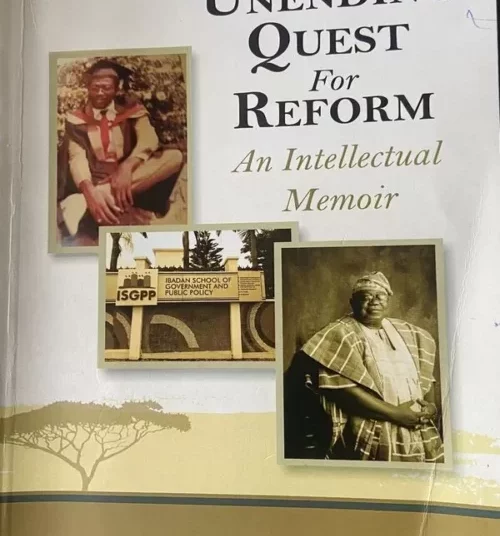Professor Tunji Olaopa’s ‘The Unending Quest for Reform: An Intellectual Memoir’ reflects on the theoretical and practical aspects of public administration and its intersection with ethics to engender sustainable reforms.
As one of the foremost public administration minds who have shaped governance theory, practice and institutional reform in Nigeria and Africa, Olaopa believes that reform is a life-long endeavour. Thus, his long-time quest to bridge the gap between administrative scholarship and public sector transformation, through his active involvement in public service.
Drawing from classical thinkers, development theorists, and reform practitioners, he illuminates his personal experiences within Nigeria’s civil service system. Such experiences delineate the bureaucracy, institutional decay, and absence of leadership ethics fraught within the government corridors, thereby lending the publication a scholarly yet practical perspective.
Olaopa also explores the importance of values in governance by arguing persuasively that reform (administrative or otherwise) does not exist in a vacuum. Rather, it is a thing of the mind and morality. Thus, transformation is impossible without reformers who are intellectually prepared, ethically grounded and emotionally resilient. His humble experiences in the work, which charts his formative years and throughout his public service career seems to testify to the success of this quality of administrative leadership.
Spanning 18 chapters and over 200 pages, The Unending Quest for Reform: A Memoir blends autobiography with policy analysis and reform theory. This provides readers both an intellectual and an intimate approach to the subject matter.
This ability to engage the readers experientially and intellectually – through the lens of political philosophy, public administration theory and development ethics – gives the book an academic value that extends beyond memoir to a manual for students, practitioners and policymakers alike. His honest and transparent narrative style in painting the state of the nation’s civil service leans more into constructive criticism and hope in the possibility of renewal, compared to the largely non-constructive critiques of today.
On the other hand, the book’s density and theoretical texture may pose a challenge to casual readers. There are certain points in the text where the depth of academic reflection can overwhelm and discourage readers who’d prefer a lighter read.
Similarly, there is a limited exploration of personal vulnerability. Although the author shares his experiences with admirable openness, moments of emotional depth are often subordinated to intellectual analysis. A deeper exploration of his inner struggles could have added further human warmth to the narrative.
Overall, The Unending Quest for Reform: A Memoir, makes a profound contribution on how to bridge the gap between thought and practice, and offers a blueprint for reform that interrogates moral conviction, professional competence and strategic vision. Olaopa’s central message – that reform begins with a transformed mind and ethical resolve – resonates strongly with contemporary leadership challenges in Nigeria, Africa and beyond.





